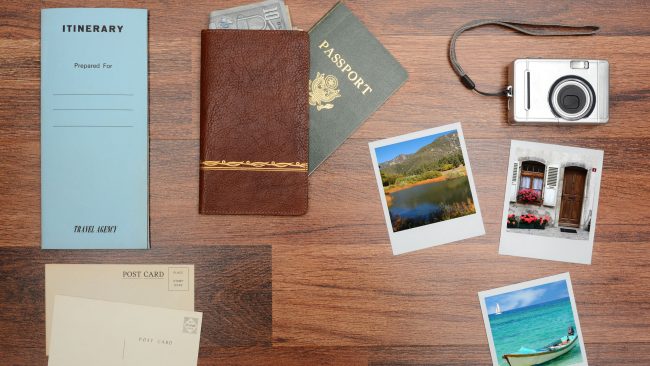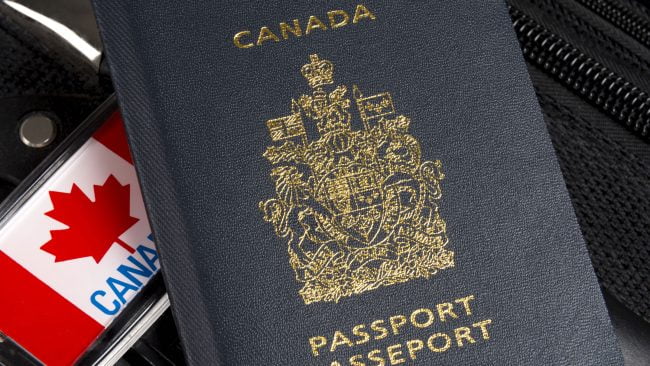Canada is a country located in North America where both English and French are spoken. Its wide range of tourist attractions, the exquisite canadian gastronomy and the fact that it is one of the favorite destinations of the so-called gay tourism make it one of the most visited countries in the world. Here we explain what requirements and documentation you will need to travel to this North American country.
Below you have an index with all the points that we are going to deal with in this article.
Article Index
- 1.
- 2.
- 2.1.
- 2.2.
- 2.3.
- 3.
- 4.
- 5.
Passport Number
All citizens, regardless of their nationality, need a passport valid until one day after leaving Canada. This is so because visitors must be able to prove their identity, absence of a criminal record, evidence of airline ticket or reservation to leave Canada and financial solvency.
La economic solvency It is only an essential requirement if the applicant is the one who pays for the trip. In this case, you can present the following documents as financial solvency: income statements, savings voucher, traveler's checks ... If someone from Canada or from your country of origin pays for the trip, the financial solvency of both the applicant and the of who pays for the trip or part of it.
In any case, you will be exempt from the obligation to present a valid passport if you find yourself in any of the following cases:
- You are a Canadian citizen and you have an identity card, birth certificate or citizenship document.
- You have a legal permanent residence permit in Canada and you have documents to prove it.
- You are a US citizen and you can prove it by presenting your birth certificate or naturalization documents.
- You come from Saint Pierre and Miquelon or the USA and have a legal permanent residence permit in the USA and a Green Card.
- You are a resident French citizen or you come from Saint Pierre and Miquelon.
- You have the nationality and reside in Greenland.
It should be noted that under 18 years of age who travel without the company of an adult must carry a letter from at least one of the parents or guardians authorizing them to travel to Canada. The government of Canada does not admit the entry into the country of citizens whose passport, identity card or travel document belongs to any of the following territories: Palestinian National Authority, Ciskei, Transkei or Bofutatswana.
In any case, the information regarding visas and passports to travel to this country changes often, so it is best to confirm it by going to the nearest relevant consulate.
Visas
The visa or visa is a document issued by the emigration entity of the particular nation to which you want to travel. It is only necessary when you are going to travel to a different country from which you do not have citizenship. As a general rule, it is necessary to have a visa to enter Canada, except in express cases in which a country is exempt from this requirement.
Citizens from some EU member country, United States and Australia They are exempt from the need for a visa. Nationals of any of the following countries do not need a visa:
- A: Andorra and Antigua, Barbuda.
- B: Bahamas, Barbados, Botswana, Brunei.
- C: Vatican City, Chile, Cyprus.
- E: Slovenia.
- H: Hong Kong (SAR).
- I: Iceland, Solomon Islands, Israel (blue passports).
- J: Japan.
- L: Liechtenstein.
- M: Malta, Mexico, Monaco.
- N: Namibia, New Zealand, Norway.
- Q: Papua New Guinea.
- A: Republic of Korea.
- S: Saint Kitts and Nevis, Saint Lucia, Saint Vincent and the Grenadines, Samoa (Eastern), San Marino, Singapore, Swaziland, Switzerland.
PREMIUM QUALITY
In Canada, you can enter in one of the following ways: in transit to another country, for tourism, to reside, to study or to request political asylum. Whatever the reason, the visa must be requested at the Canadian Consulate closest to your place of residence or, failing that, at the Canadian Embassy. These are the types of visas available for Canada:
- Visitor / tourist: It is applied in cases of temporary stay in the country, for which it forces to return to the country of origin at the end of the established time. To qualify for this visa, you must be in good health and have sufficient financial solvency to cover the expenses derived from your stay. If you are going to stay for more than 6 months, you must pass a medical examination. Agencies such as Aviatur (Colombia) are authorized to submit this request as long as a series of special instructions are followed.
- Study authorization: is required for formal studies at academic institutions in Canada. Language courses or courses of a non-academic nature are excluded. It must be accompanied by a visitor visa.
- Temporary job: This is an authorization to work temporarily in Canada. Applications are approved provided the applicant submits a formal job offer approved by a Human Resource Center in Canada.
- Temporary residence: You need a work permit in Canada to apply for this visa. Interested parties should contact the embassy or consulate for specific instructions, as prior authorization is required. If requested for study purposes, the interested party must request a student permit and pay the corresponding fee.
- Immigrant: will be approved based on what the applicant can contribute to improve the country's economy or to support family reunification.
There are four different categories for the immigrant visa to Canada depending on the purposes for which we are going to immigrate: skilled worker, family member, business person and refugee. In the latter case, it is aimed at those who need protection from situations of persecution and can be requested either from their place of origin or when arriving at a port of entry into Canada.
Documentation to attach
Whether it is a tourist visa or a transit visa, its validity is up to 6 months, depending on the circumstances of the applicant. If your passport does not indicate a departure date, it is understood that you can stay in the country for a maximum of 3 months (90 days) from the day of your entry into Canada. The cost is $ 75 (€ 104) for a single entry visa and $ 150 (€ 208) for multiple entries.
For tourist or transit visas, the following documents must be presented when applying:
- Valid passport.
- Proof of immigrant status in the country of residence (if applicable).
- Application form duly completed.
- 2 passport-size photographs.
- Proof of financial solvency (can include letter from employment company, bank or mortgage statement or invitation letter from a Canadian resident).
- Payment of fees.
- Employment documents (if applicable).
- Detailed travel plans.
After reviewing your application, a visa officer may call the applicant for an interview. In case of not speaking English, French or Spanish, the applicant must be accompanied by an interpreter. Likewise, you must demonstrate that you meet the requirements of the Canadian Immigration Law and its Regulations, that your stay will be temporary and that you will return to your country at the end of it.
If you wish to extend your stay, you must apply to the nearest Canadian immigration center before the date on which your visa expires in good time. Keep in mind that it can take up to 10 business days. If a specific date appears on your visa, you will not be able to extend your stay in Canada beyond the designated day.
Photography
The Canadian government is especially demanding in relation to the photograph that must be included in the visa. The photographer must indicate on the back of each photo the name of the studio, its address and the date the photos were taken, which must meet the following requirements:
- 2 identical photographs
- Good quality paper
- External measurements: 7 cm x 5 cm
- There should be between 31-36mm from the chin to the top of the head, including the hair
- White or very light gray background, without any shadow (not even behind hair or ears)
- Frontal photo showing the bare head and shoulders
- Neutral, serious face expression, looking at camera and with closed mouth
In addition, a statement from the guarantor must be included on the back of one of the photos in which the stamp or photographer data. Do not forget to check all the photos well before delivering them, since those that do not meet these requirements will be rejected.
Working Holiday Program
The visa Working holiday is part of the IEC program (International Experience Canada) and allows young people between the ages of 18 and 35 to work legally in Canada for one year without the need for a prior contract. You can work in any sector except health, including the position of caregiver of children or the elderly.
Before starting the application process, you must ensure that you meet the following requirements:
- Your country has an agreement with the Canadian Government.
- You are between 18 and 35 years old (if you are Mexican, you must be registered as a student in Mexico).
- You have paid online the participation fee for the program ($ 150 approx.) And the Open Work Permit Holder Fee, equivalent to about $ 100.
- You have not previously participated in the IEC program.
- You have the equivalent of 2.500 canadian dollars to cover your stay.
- You have health insurance.
To make the request, you must create an account Compass once the application period for your country is open. Keep in mind that there is a limited availability of places for each country, so our advice is to be quick, since they usually sell out in less than 20-30 min. In case the places run out, you can send your request to be on the waiting list.
It is also necessary to apply for a work permit through Mycic (you can access by clicking this link). Instructions on how to create your account will be detailed in the Conditional Acceptance Letter sent by the IEC and you will have a maximum of 14 days to send it. Otherwise, your place will be canceled.
Scholarships
It is also possible to live temporarily in Canada by granting a scholarship to study or do an internship in a company. There are several organizations that administer scholarship programs, usually aimed at graduate students or professors / researchers. In any case, those interested should also seek financial help in their country of origin. Here are some of the most popular scholarships:
- Fundación Amancio Ortega: aimed at Spanish students who are in the 4th year of ESO and wish to start their high school studies in Canada or the United States. The scholarship covers 100% of the cost of the school year (travel, validation of studies, school fees, accommodation ...).
- Canadian International Development Agency Scholarships: These are scholarships for students who wish to complete their studies in Canada.
- International Council for Canadian Studies: scholarships aimed at carrying out research work at the undergraduate and graduate level. They also include grants for internships.
- International Development Research Center (IDRC) Funding: These scholarships are aimed at citizens of developing countries. They are funds to carry out research activities.
- Ontario Graduate Scholarship Program (OGS): This program has been designed with the aim of promoting excellence in undergraduate, doctoral or master's studies.
- Québec Merit Fellowships Program for Foreign Students: These are doctoral research grants, short-term research or professional development grants, and post-doctoral grants.
- The Rotary Foundation's Ambassadorial Scholarships: It is currently the world's largest privately funded international scholarship program. It offers more than 1.000 scholarships annually.
- Visiting Fellowships in Canadian Government Laboratories: The Canadian National Research Council offers research collaborator positions to newly graduated scientists and engineers.
- The Trudeau Foundation Doctoral Scholarships Program: This program offers up to 15 places each year for high-level doctoral candidates in the areas of social sciences and humanities.
Citizenship and permanent residence
Not all foreign citizens are eligible for the Canadian Citizenship Certificate. If you have criminal charges, you were the subject of an order of removal or deportation from Canada, you have been convicted of criminal charges in the last 3 years, you are under investigation for war crimes or your citizenship was revoked in the last years you will not be able to obtain citizenship .
In any case, obtaining the certificate of citizenship is subject to meeting the following requirements:
- You are a permanent resident (landed immigrant in English).
- You have lived in Canada for a period of 3 years in the last 4 years (if you have spent time in a correctional institution, this period does not apply to the 3-year period).
- You are 18 years old.
- You speak English or French.
- You know the details of Canadian history and society, as well as the rights and duties of Canadian citizens.
To demonstrate your general knowledge of Canada, all applicants who meet the above requirements must undergo a written or oral examination before an immigration judge. The test can include questions related to politics, economics, geography, history, etc. The process until obtaining citizenship per se it can last between 5 months and several years.
If you wish to apply for permanent residence in the province of Québec, you will have to receive the Québec Selection Certificate o Certificate of Selection of Quebec (CSQ). This province establishes its own standards and procedures for the selection of immigrants, so it has autonomy to select only those candidates who have the best chance of establishing themselves in the economy and society of the province.
This article has been shared 1167 times. We have spent many hours collecting this information. If you liked it, share it, please:








